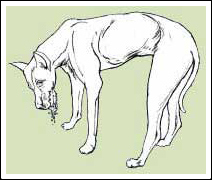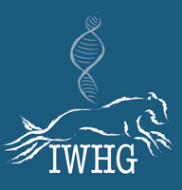
Bloat
(Gastric dilatation/volvulus, GDV)
THIS IS AN EMERGENCY!
YOU MUST GET YOUR DOG TO A VET AS SOON AS POSSIBLE!
Bloat is a very serious, life-threatening health risk for many dogs, especially deep chested breeds. Bloat can kill in less than an hour so recognizing the condition and getting your wolfhound to a vet is extremely important.
Anatomy of Bloat
Bloat refers to two conditions. The first is gastric dilatation, in which the stomach distends with gas and fluid. The second is volvulus - or torsion, in which the distended stomach rotates. The spleen is attached to the wall of the stomach, and therefore rotates with the stomach. If not corrected quickly, the blood supply is cut off and the tissue of the stomach wall will die. Bloat develops suddenly, usually in a healthy active dog and in all circumstances the dog must be taken to the vet quickly.

Symptoms
- Swelling of the abdomen (particularly on the left side) and tender.

- Restlessness and pacing, standing with head down.
- Unproductive vomiting may bring up foam but no food.
- Stomach sounds like a drum when tapped .
- Lack of normal gurgling sounds from stomach.
- Salivating.
- Dark red gums (pale in late stages).
- Anxiety.
- Whining for no apparent reason.
Possible causes
- Exercising vigorously before or immediately after a meal.
- Rapid eating (can cause gulping of air).
- Drinking a large amount of water too quickly (can cause gulping of air) .
- Genetic pre-disposition
- Stresses such as travel, fear, bitches in season etc.
- Suggestions for avoiding bloat
- Don't feed after exercising - ideally let an hour pass before and after feeding.
- Don't let the dog gulp large amounts of water after exercising.
- Consider splitting the daily feed over two meals.
- Avoid stress.
- If feeding a dry complete food, always ensure it does not swell when soaked - as it will do this in the stomach of the dog. Soak a small amount of the food to ascertain whether it will swell or simply soften.
- If your dog gulps his food, consider using a specially designed food bowl or placing a large stone in the centre of the feed bowl (to fill one quarter the area of the bowl) - this can slow the dogs eating down as he negotiates the stone.
Veterinary Care
If dilatation is the only symptom, the Vet may try to relieve the buildup of gas with a stomach tube inserted down the mouth and through the oesophagus into the stomach. Gas needs to be expelled plus some of the contents within the stomach. It is possible that relieving the trapped gas will suffice but if not, or if it is apparent that the gut has twisted, the dog is then prepared for surgical intervention to examine the abdominal organs to assess the damage and to also reposition the stomach. In many cases the spleen is seen to be enlarged and may need to be removed. The vet will attach the dog to a saline drip to reduce toxic shock and restore the electrolyte balance. Post-operative care is as crucial as the initial emergency surgical treatment and usually the dog requires intensive care for at least a few days but needs constant monitoring in the first 48 hours.
Shock and dehydration are very common post-operative complications which require careful experienced monitoring. On returning home the dog will need careful nursing and management of diet which will be advised upon by your vet. The majority of dogs having undergone surgery will recover fully in time.
There is a procedure called a gastropexy whereby the stomach is stitched into place to prevent further rotations. You can talk to your vet about this procedure and they can decide whether it is viable to perform it during surgery or whether it would be in the dogs best interest to have this done as a preventative measure at a later date once it has recovered. Whilst a gastropexy can prevent further twisting of the stomach, it does not prevent the dog from gassing if it is prone to this for some reason.



